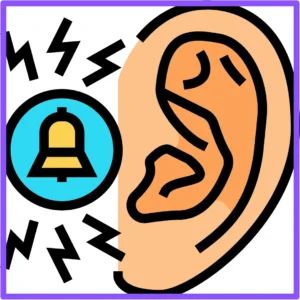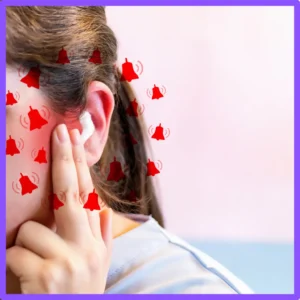Silence the Ringing: All About Tinnitus
Tinnitus, often described as a ringing in the ears, affects millions of people. While the sounds can vary—from buzzing to roaring—they share one thing in common: no external source generates them. Let’s explore the causes, symptoms, and ways to manage this condition, helping you better understand all about tinnitus and find relief.
What is Tinnitus?
It’s is the perception of sound without an external source. This phantom sound may occur in one or both ears or inside the head. While it’s commonly referred to as “ringing in the ears,” the sounds can include:
- Buzzing
- Roaring
- Whistling
- Clicking
- Humming
It may come and go or persist continuously. For some, it’s a mild inconvenience; for others, it can significantly impact daily life.
Find out more about the connection between tinnitus and dementia.
Types
- Subjective Tinnitus: Only the individual can hear the sound. This is the most common type.
- Objective Tinnitus: A doctor may detect the sound during an examination. This type is rare.

What Causes Tinnitus?
This condition has many potential causes. Common triggers include:
Hearing Loss
Hearing loss often accompanies it. Damage to the auditory system can lead the brain to compensate by creating phantom sounds.
Noise Exposure
Exposure to loud noises—at concerts, workplaces, or through headphones—can damage inner ear structures, causing tinnitus.
Explore more about protecting your ears from occupational hearing loss.
Medications
Certain medications, like non-steroidal anti-inflammatory drugs or antibiotics, may cause tinnitus as a side effect.
Ear Issues
Earwax buildup or infections can block the ear canal, leading to temporary tinnitus.
Head and Neck Injuries
Injuries can damage nerves or blood flow pathways, resulting in tinnitus.
Medical Conditions
Conditions like Ménière’s disease, high blood pressure, and thyroid disorders may contribute to tinnitus.
Learn more about Meniere’s disease.
Recognizing the Symptoms of Tinnitus
Symptoms vary widely. You may experience:
- Ringing or buzzing sounds
- High- or low-pitched noises
- Rhythmic sounds matching your heartbeat (pulsatile tinnitus)
Symptoms may worsen with stress, fatigue, or certain movements. For some, it affects concentration, sleep, or emotional well-being.

Diagnosing Tinnitus
A hearing care provider will evaluate your symptoms and medical history. They may:
- Examine your ears for blockages or infections.
- Conduct hearing tests to assess auditory function.
- Order imaging tests like MRIs if pulsatile tinnitus is present.
This comprehensive approach helps identify potential underlying causes and guide treatment options.
Effective Tinnitus Management Strategies
While there’s no universal cure for tinnitus, various treatments can reduce symptoms and improve quality of life.
Sound Therapy
Sound therapy uses external noise to mask tinnitus or retrain the brain. Popular options include:
- White Noise Machines: Generate soothing sounds like rain or ocean waves.
- Hearing Aids: Amplify environmental sounds, reducing tinnitus’s prominence.
- Combination Devices: Merge hearing aids with sound generators for dual benefits.
Behavioral Therapies
Behavioral approaches help manage the emotional and psychological impacts of tinnitus.
- Cognitive Behavioral Therapy (CBT): Teaches strategies to reframe negative thoughts about tinnitus.
- Tinnitus Retraining Therapy (TRT): Combines counseling and sound therapy to habituate the brain to tinnitus.
Find out more about tinnitus management.
Lifestyle Adjustments
Simple lifestyle changes can make a big difference:
- Avoid loud noises and use ear protection.
- Reduce stress with relaxation techniques like yoga or meditation.
- Limit caffeine and alcohol, which may worsen symptoms.
Medications
Although no drugs specifically treat tinnitus, medications can address related issues like anxiety or insomnia.
Can Tinnitus Be Prevented?
You can take steps to reduce your risk:
- Wear ear protection in noisy environments.
- Keep headphone volumes at safe levels.
- Manage chronic health conditions like high blood pressure.
- Avoid ototoxic medications when possible.
Living with Tinnitus: Thriving Despite the Noise
Adapting to tinnitus may seem daunting, but with the right strategies, you can reclaim your quality of life. Here are some tips to help you thrive:
Build a Support System
Connect with others who understand your experience. Support groups, whether in person or online, can provide encouragement and practical advice.

Focus on Relaxation
Stress can amplify symptoms. Practice relaxation techniques such as deep breathing, mindfulness, or progressive muscle relaxation. Even activities like gardening or gentle yoga can help reduce stress levels.
Stay Active
Engage in hobbies, exercise, or social activities that bring joy and distraction. Physical activity not only benefits overall health but also shifts focus away from the ringing.
Manage Your Environment
Create a soothing environment at home and work. Use background noise like soft music, fans, or white noise machines to mask sounds.
Educate Yourself
Learn about tinnitus and its management options. The more you understand, the more empowered you’ll feel to manage it effectively.
Practice Sleep Hygiene
Good sleep habits can make a world of difference. Maintain a consistent sleep schedule, avoid caffeine before bed, and use calming techniques to unwind.
Seek Professional Guidance
A hearing care provider can recommend tailored strategies and tools to manage your symptoms. Personalized treatment can address your specific challenges and goals.
Living with ringing doesn’t have to mean enduring constant distress. With proactive steps, you can regain control and find peace.
Take Control of Tinnitus with Stanford Hearing
If tinnitus is affecting your life, don’t wait to seek help. Our dedicated team offers personalized care to help you manage tinnitus effectively. Contact Stanford Hearing today to schedule your consultation and discover how we can support your journey to relief.
